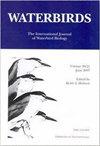墨西哥湾西部东威鱼(Tringa semipalmata semipalmata)的迁徙和越冬地点
IF 0.6
4区 生物学
Q3 ORNITHOLOGY
引用次数: 0
摘要
摘要了解个体或种群在不同年生命周期阶段之间的地理联系对有效的保护决策至关重要。滨鹬(Tringa semipalmata)由两个不同的亚种组成,它们在北美的繁殖栖息地分开,东部滨鹬在大西洋和墨西哥湾沿岸的河口沼泽中繁殖,西部滨鹬在北美西部内陆潮湿的草原和大草原上繁殖。利用轻型地理定位器研究了2015 - 2019年德克萨斯州墨西哥湾沿岸繁殖的东威利鱼的迁徙路径和越冬地点。从9个地理定位器获取的数据分析表明,所有鸟类都于7月5日至26日离开德克萨斯州,进行了2 - 5天的飞行,并于7月8日至30日到达越冬地。所有的鸟类都在中南美洲的太平洋沿岸过冬。春季,候鸟于3月9日至24日离开越冬地点,飞行3 - 4天,于3月12日至27日抵达繁殖地。这些结果与之前的研究结果相反,之前的研究表明,大西洋繁殖的东威利鱼在南美洲北部的大西洋沿岸越冬。这项工作对滨鸟保护规划具有启示意义,目前认为所有在太平洋沿岸越冬的滨鸟都是西部的滨鸟。本文章由计算机程序翻译,如有差异,请以英文原文为准。
Migration and Wintering Locations of Breeding Eastern Willet (Tringa semipalmata semipalmata) in the Western Gulf of Mexico
Abstract. Knowledge of the geographic linking of individuals or populations between different annual life cycle stages is essential for effective conservation decision making. The Willet (Tringa semipalmata) is composed of two distinct subspecies that are separated by breeding habitat in North America, with eastern Willets breeding in estuarine marshes along the Atlantic and Gulf Coasts and western Willets breeding in wet grasslands and prairies in the interior west of North America. We studied the migratory paths and wintering locations of Texas Gulf Coast breeding eastern Willets from 2015 to 2019 using light-level geolocators. Data analysis from 9 retrieved geolocators indicated that all birds departed Texas 5-26 July, made a 2–5-day flight, and arrived on the wintering grounds 8–30 July. All birds wintered on the Pacific coasts of Central and South America. In spring, the birds departed the wintering location 9–24 March, made a 3–4-day flight and arrived on the breeding grounds 12–27 March. These results are in contrast to previous work which showed that Atlantic breeding eastern Willets overwintered on the Atlantic coast in northern South America. This work has implications for shorebird conservation planning, which currently considers all Willets overwintering on the Pacific coast to be western Willets.
求助全文
通过发布文献求助,成功后即可免费获取论文全文。
去求助
来源期刊

Waterbirds
生物-鸟类学
CiteScore
1.30
自引率
0.00%
发文量
0
审稿时长
6-12 weeks
期刊介绍:
Waterbirds is an international scientific journal of the Waterbird Society. The journal is published four times a year (March, June, September and December) and specializes in the biology, abundance, ecology, management and conservation of all waterbird species living in marine, estuarine and freshwater habitats. Waterbirds welcomes submission of scientific articles and notes containing the results of original studies worldwide, unsolicited critical commentary and reviews of appropriate topics.
 求助内容:
求助内容: 应助结果提醒方式:
应助结果提醒方式:


